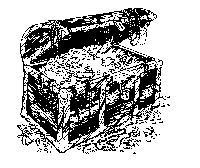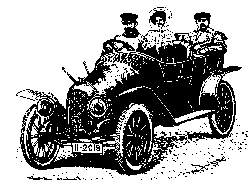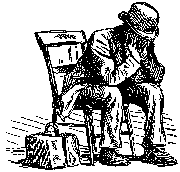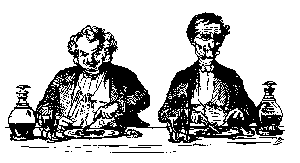Carats, Chum, Doozies, Going Down?, Cut and Dried and Some Very Cold Brass Monkeys.
Operators, Really Slick Operators, Are Standing By.
Dear Evan: Lately I've become addicted to the jewelry show on one of the
home shopping cable TV channels. I haven't bought anything yet, but in the
meantime, I'm hoping you can answer a very basic question. What's the difference
between "carat," the measure of the size of a diamond, and "karat," the measure of
the purity of gold? Are the words related? -- Edith Freedle, via the Internet.
I'd like to announce at the outset that I am going to resist the temptation to
indulge in tiresome and annoying vegetable puns in my answer, and I hope that you
appreciate the effort this requires. I'm glad you asked this question, though, because I
remember wondering about "carat" and "karat" myself when I was very young. A mere
sprout, in fact.
 "Carat" and "karat" are indeed related, and spring from the same source, the
Arabic word for "bean pod." Now, much as we all love beans, not many of us would
go so far as to equate the finest jewels and gold with lowly little legumes, so how did
we come up with "carat" and "karat"? Well, when jewels first began to be used as a
means of exchange and payment, people needed a way to measure their relative
weight and consequent value. Traders discovered that the smallest jewels weighed
about the same as one bean, so larger gems could be described as "two beans" --
two carats -- and so on. The beans in question were, by the way, carob beans,
known to us today as a popular "chocolate substitute," more evidence of the collapse
of civilization. A "carat" today is standardized at 200 milligrams, which takes the
burden off the beans.
"Carat" and "karat" are indeed related, and spring from the same source, the
Arabic word for "bean pod." Now, much as we all love beans, not many of us would
go so far as to equate the finest jewels and gold with lowly little legumes, so how did
we come up with "carat" and "karat"? Well, when jewels first began to be used as a
means of exchange and payment, people needed a way to measure their relative
weight and consequent value. Traders discovered that the smallest jewels weighed
about the same as one bean, so larger gems could be described as "two beans" --
two carats -- and so on. The beans in question were, by the way, carob beans,
known to us today as a popular "chocolate substitute," more evidence of the collapse
of civilization. A "carat" today is standardized at 200 milligrams, which takes the
burden off the beans.
"Karat," the measure of the purity of gold, also is based on the weight of beans,
but in this case has come to equal a unit of one-twenty-fourth pure gold. Thus, an 18-
karat gold ring is 18 parts gold and 6 parts other metal, making a total of twenty-four
parts or twice your monthly salary in easy weekly payments. Isn't math fun?
But If You Try It With Money, All You Get Is Lawyers.
Dear Evan: I found an interesting word in a New York Times article today
about how skippers of boats off the California coast take tourists out to see sharks,
and encourage the latter to congregate by luring them with buckets of blood, fish
parts, and a pig's head or two thrown in the water. This practice is referred to as
"chumming." I wonder what the derivation is -- perhaps it's as simple as it sounds.
Naturally, the surfers don't appreciate it, but as one said, "you don't have to outswim
the sharks, just your buddy!" -- George Bower, via the Internet.
I missed that particular article in the Times, but judging from what you've said,
tourists in California must be pretty hard up for excitement. The average shark is
dumb as a sack of rocks and about as much fun to watch. Whatever happened to
Disneyland? Then again, maybe the real fun comes from watching the sharks chase
the surfers -- that sounds like a typically Californian pastime.
 I'm not entirely certain what you mean by "perhaps it's as simple as it sounds."
Tossing a pig's head or two in the water would probably strike many sharks as a
friendly ("chummy") gesture, but knowing how most fishermen regard sharks, that
origin of the term seems unlikely. That "friend" sense of "chum," by the way, dates
back to 17th century England and is generally thought to be a students' slang
contraction of "chamber-mate," or roommate.
I'm not entirely certain what you mean by "perhaps it's as simple as it sounds."
Tossing a pig's head or two in the water would probably strike many sharks as a
friendly ("chummy") gesture, but knowing how most fishermen regard sharks, that
origin of the term seems unlikely. That "friend" sense of "chum," by the way, dates
back to 17th century England and is generally thought to be a students' slang
contraction of "chamber-mate," or roommate.
As to the "throw fish guts in the water in order to attract sharks" sense of
"chum," all the dictionaries I've consulted maintain a discreet "origin unknown," noting
only that the word is of American origin and first appeared in the mid-19th century.
But I have a suspicion that "chum" in this sense may be related to a fish common to
the Pacific known as the "chum salmon," which takes its name from a Chinook Indian
word meaning "spotted or striped." Perhaps this "chum" salmon was used so
frequently as "chum" that its proper name became a generic term for chopped-up fish.
As I said, it's only a theory, so I'll just throw it in the water and see what it attracts.
Oh Say, Do You Doozy?
Dear Evan: What is the origin of the word dousie, as in "that's a dousie!" --
Terry Sheppard, via the Internet.
We actually looked into the origin of the word "doozy" (which is how it's usually
spelled) last year in response to a question from another reader. She had been
reminded of the word while reading "a doozy of a collection of short essays by Andrei
Codrescu," and upon looking it up in a dictionary, found it correctly defined as
meaning "an extraordinary one of its kind." Her question arose from the dictionary's
comment that "doozy" arose as an alteration of "daisy," which struck her as unlikely.
She had been wondering if "doozy" had actually come from the Polish word "duzy,"
meaning "big." It was an interesting theory, but, as it turned out, an unnecessary one.
 According to the Random House Historical Dictionary of American Slang,
"doozy" does indeed probably spring from "daisy," which has been, since the 18th
century, a synonym for "excellent, superior or fine." The word "doozy" first appeared
in 1903 as an adjective, and the spread of the word may have been influenced by the
popularity of an Italian actress by the name of Eleonora Duse (1859-1924). Evidently
Eleonora was quite a doozy.
According to the Random House Historical Dictionary of American Slang,
"doozy" does indeed probably spring from "daisy," which has been, since the 18th
century, a synonym for "excellent, superior or fine." The word "doozy" first appeared
in 1903 as an adjective, and the spread of the word may have been influenced by the
popularity of an Italian actress by the name of Eleonora Duse (1859-1924). Evidently
Eleonora was quite a doozy.
The late etymologist and poet John Ciardi, by the way, proposed that "doozy"
arose as a corruption of "dusie," short for Dusenberg, a fine (and expensive)
American automobile produced from 1921-1937. I am a great admirer of Mr. Ciardi's
work, but a glance at the above dates will reveal what's wrong with his theory in this
case -- "doozy" appeared in American slang several years before the Dusenberg car
even existed.
Still, Mr. Ciardi wasn't completely out to lunch on this one. The popularity of
the Dusenberg automobile probably gave the word "doozy" a boost among the
younger generation in the early 20th century, and may well have ensured its survival
to the present day.
32 Bits of Heaven.
Dear Evan: When computers "go down," where do they go? -- Candace
Drimmer, via the Internet.
Funny you should ask this question. Recently, for reasons that remain
unclear but may be connected to my being dropped on my head as a child, I decided
to install Windows 95 on my theretofore perfectly cooperative home computer. While
it is not my intention to prejudice my readers against Mr. Gate's latest marketing
triumph, the more observant among you may have noticed that I am writing this
column in charcoal on an old piece of plywood. Suddenly it's easier this way.
 I don't know where computers go when they "go down," though ever since I
began researching your question I've had "Ding-dong, the witch is dead" from the
movie version of "The Wizard of Oz" running through my head ("She's gone where the
goblins go, below, below, below...). The use of "down" to refer to a computer that is
not functioning is fairly recent, the earliest use reported by the Oxford English
Dictionary being in 1965. The opposite of "down" in computerese is, of course, "up" or
"up and running," a paradisiacal state my own computer enjoyed until I fell under Mr.
Bill's evil spell.
I don't know where computers go when they "go down," though ever since I
began researching your question I've had "Ding-dong, the witch is dead" from the
movie version of "The Wizard of Oz" running through my head ("She's gone where the
goblins go, below, below, below...). The use of "down" to refer to a computer that is
not functioning is fairly recent, the earliest use reported by the Oxford English
Dictionary being in 1965. The opposite of "down" in computerese is, of course, "up" or
"up and running," a paradisiacal state my own computer enjoyed until I fell under Mr.
Bill's evil spell.
While a few computer terms such as "down," "up" and "crash" have migrated
from the inner sanctums of computerdom into general use, most of the real oddities,
words such as "foo," "bogosity" and "dogwash," remain the province of hardcore
hackers. Readers with access to the Internet should check out the Jargon File, a
long-term collective online project documenting computer slang, which can be found
on the World Wide Web. The Jargon File has
also been published in "hardcopy" (i.e., book) form as "The New Hacker's Dictionary,"
edited by Eric Raymond (MIT Press, 1993).
Please Pass the Pemmican.
Dear Evan: My friend and I are having a word debate (not to be confused with
a wordy debate) and we turn to you as the final authority. Is the expression "cut and
dry" or "cut and dried"? To what does it refer? -- Richard B. Kaplan, via the Internet.
Well, I'm glad to hear that I'm the final authority on something -- it's important to
one's self-esteem. Even Sherlock Holmes, in the midst of a baffling case which he
would eventually solve to the amazement of all around him, would invariably take time
out to prattle on a bit about the ten thousand varieties of cigar ash he could identify. I
suppose his customers regarded Holmes's little digressions as the price of having their
cases solved, much as my readers have grown used to my mentioning my large
orange cat every so often, which I have just done, so let us proceed to your question.
The phrase you're thinking of is "cut and dried," referring to something that is
routine, commonplace or ordinary, and thus hackneyed, boring and predictable. State
Department spokespeople, for example, are expert vendors of "cut and dried" answers
to reporters' questions, and Hollywood has long been famous for movie plots so "cut
and dried" that filmgoers really ought to demand that deja vu insurance be included in
the price of their tickets.
 The origins of the phrase "cut and dried," however, are far from settled, which
gives your question a nice ironic twist. One popular contender for the origin of the
phrase comes to us from the world of lumber. Timber, it seems, only becomes lumber when it is cut to standard sizes (such as "two-by-four") and dried, either in open air or in a kiln.
Thus, cut and dried lumber, the theory goes, eventually came to be used as a
metaphor for anything which is predictable, reliable, and not very exciting.
The origins of the phrase "cut and dried," however, are far from settled, which
gives your question a nice ironic twist. One popular contender for the origin of the
phrase comes to us from the world of lumber. Timber, it seems, only becomes lumber when it is cut to standard sizes (such as "two-by-four") and dried, either in open air or in a kiln.
Thus, cut and dried lumber, the theory goes, eventually came to be used as a
metaphor for anything which is predictable, reliable, and not very exciting.
Another theory also traces the phrase to a woody origin, but this time to firewood. One of the few things I learned before being booted out of the Cub Scouts many years ago is that campfires
work best if the wood is, you guessed it, cut and dried before starting the fire.
Still other theories trace the phrase to tobacco (which must be cut and dried to be used), and
to the practice of preserving various forms of meat by cutting and drying. Of all the various
theories, I must admit that I find the "dried meat" one the most appealing, simply because it is
easy to imagine travellers on a long voyage coming to regard "cut and dried" meat with the sort of weary loathing that modern moviegoers know so well.
Origin of the Specious.
Dear Evan: Can you please tell me where the expression "Brass Monkeys"
(used when it's really cold) comes from. -- Karen, via the Internet.
 Considering that monkeys are our evolutionary cousins, more or less, the
development of English slang has been of two minds regarding our little primate pals.
The monkey crops up in countless folk sayings and catch phrases, some of which are
vaguely affectionate -- to call a child a "monkey," for instance. More often, however,
the monkey has been used as an object of mockery, from "making a monkey of"
someone, meaning to cause them to look foolish, to "I'll be a monkey's uncle," an
expression of astonishment. When we don a "monkey suit," or tuxedo, we're
comparing our appearance to that of the organ grinder's monkey, dressed in a gaily
colored outfit, that was a fixture of urban life in the 19th century. And while "monkey
business" may connote either innocent silliness or underhanded behavior, to have a
"monkey on one's back" is to be plagued by a stubborn addiction, usually to illegal
drugs. Monkeys could use a good public-relations agent.
Considering that monkeys are our evolutionary cousins, more or less, the
development of English slang has been of two minds regarding our little primate pals.
The monkey crops up in countless folk sayings and catch phrases, some of which are
vaguely affectionate -- to call a child a "monkey," for instance. More often, however,
the monkey has been used as an object of mockery, from "making a monkey of"
someone, meaning to cause them to look foolish, to "I'll be a monkey's uncle," an
expression of astonishment. When we don a "monkey suit," or tuxedo, we're
comparing our appearance to that of the organ grinder's monkey, dressed in a gaily
colored outfit, that was a fixture of urban life in the 19th century. And while "monkey
business" may connote either innocent silliness or underhanded behavior, to have a
"monkey on one's back" is to be plagued by a stubborn addiction, usually to illegal
drugs. Monkeys could use a good public-relations agent.
The slang term "brass monkeys" is actually a shortening of the phrase
"cold enough to freeze the tail off a brass monkey." (Common variants of the phrase almost
invariably specify a more risque element of the monkey's anatomy, but we'll go with
"tail" for purposes of this column.) While a brass monkey might seem an outlandish
item, such knickknacks were, in fact, quite popular in Victorian drawing rooms, usually
found in sets of three, set in the classic kitsch "see no evil, hear no evil, speak no evil"
pose. Given that brass monkeys were the Lava Lamps of the age and thus never far
from the Victorian mind, their use in the phrase is not surprising. Of course, given the
shocking dearth of brass monkeys in modern living rooms, it's also not surprising that
the phrase seems so mysterious to us today.
Back to main page
 "Carat" and "karat" are indeed related, and spring from the same source, the
Arabic word for "bean pod." Now, much as we all love beans, not many of us would
go so far as to equate the finest jewels and gold with lowly little legumes, so how did
we come up with "carat" and "karat"? Well, when jewels first began to be used as a
means of exchange and payment, people needed a way to measure their relative
weight and consequent value. Traders discovered that the smallest jewels weighed
about the same as one bean, so larger gems could be described as "two beans" --
two carats -- and so on. The beans in question were, by the way, carob beans,
known to us today as a popular "chocolate substitute," more evidence of the collapse
of civilization. A "carat" today is standardized at 200 milligrams, which takes the
burden off the beans.
"Carat" and "karat" are indeed related, and spring from the same source, the
Arabic word for "bean pod." Now, much as we all love beans, not many of us would
go so far as to equate the finest jewels and gold with lowly little legumes, so how did
we come up with "carat" and "karat"? Well, when jewels first began to be used as a
means of exchange and payment, people needed a way to measure their relative
weight and consequent value. Traders discovered that the smallest jewels weighed
about the same as one bean, so larger gems could be described as "two beans" --
two carats -- and so on. The beans in question were, by the way, carob beans,
known to us today as a popular "chocolate substitute," more evidence of the collapse
of civilization. A "carat" today is standardized at 200 milligrams, which takes the
burden off the beans.  I'm not entirely certain what you mean by "perhaps it's as simple as it sounds."
Tossing a pig's head or two in the water would probably strike many sharks as a
friendly ("chummy") gesture, but knowing how most fishermen regard sharks, that
origin of the term seems unlikely. That "friend" sense of "chum," by the way, dates
back to 17th century England and is generally thought to be a students' slang
contraction of "chamber-mate," or roommate.
I'm not entirely certain what you mean by "perhaps it's as simple as it sounds."
Tossing a pig's head or two in the water would probably strike many sharks as a
friendly ("chummy") gesture, but knowing how most fishermen regard sharks, that
origin of the term seems unlikely. That "friend" sense of "chum," by the way, dates
back to 17th century England and is generally thought to be a students' slang
contraction of "chamber-mate," or roommate. According to the Random House Historical Dictionary of American Slang,
"doozy" does indeed probably spring from "daisy," which has been, since the 18th
century, a synonym for "excellent, superior or fine." The word "doozy" first appeared
in 1903 as an adjective, and the spread of the word may have been influenced by the
popularity of an Italian actress by the name of Eleonora Duse (1859-1924). Evidently
Eleonora was quite a doozy.
According to the Random House Historical Dictionary of American Slang,
"doozy" does indeed probably spring from "daisy," which has been, since the 18th
century, a synonym for "excellent, superior or fine." The word "doozy" first appeared
in 1903 as an adjective, and the spread of the word may have been influenced by the
popularity of an Italian actress by the name of Eleonora Duse (1859-1924). Evidently
Eleonora was quite a doozy.
 I don't know where computers go when they "go down," though ever since I
began researching your question I've had "Ding-dong, the witch is dead" from the
movie version of "The Wizard of Oz" running through my head ("She's gone where the
goblins go, below, below, below...). The use of "down" to refer to a computer that is
not functioning is fairly recent, the earliest use reported by the Oxford English
Dictionary being in 1965. The opposite of "down" in computerese is, of course, "up" or
"up and running," a paradisiacal state my own computer enjoyed until I fell under Mr.
Bill's evil spell.
I don't know where computers go when they "go down," though ever since I
began researching your question I've had "Ding-dong, the witch is dead" from the
movie version of "The Wizard of Oz" running through my head ("She's gone where the
goblins go, below, below, below...). The use of "down" to refer to a computer that is
not functioning is fairly recent, the earliest use reported by the Oxford English
Dictionary being in 1965. The opposite of "down" in computerese is, of course, "up" or
"up and running," a paradisiacal state my own computer enjoyed until I fell under Mr.
Bill's evil spell.
 The origins of the phrase "cut and dried," however, are far from settled, which
gives your question a nice ironic twist. One popular contender for the origin of the
phrase comes to us from the world of lumber. Timber, it seems, only becomes lumber when it is cut to standard sizes (such as "two-by-four") and dried, either in open air or in a kiln.
Thus, cut and dried lumber, the theory goes, eventually came to be used as a
metaphor for anything which is predictable, reliable, and not very exciting.
The origins of the phrase "cut and dried," however, are far from settled, which
gives your question a nice ironic twist. One popular contender for the origin of the
phrase comes to us from the world of lumber. Timber, it seems, only becomes lumber when it is cut to standard sizes (such as "two-by-four") and dried, either in open air or in a kiln.
Thus, cut and dried lumber, the theory goes, eventually came to be used as a
metaphor for anything which is predictable, reliable, and not very exciting.
 Considering that monkeys are our evolutionary cousins, more or less, the
development of English slang has been of two minds regarding our little primate pals.
The monkey crops up in countless folk sayings and catch phrases, some of which are
vaguely affectionate -- to call a child a "monkey," for instance. More often, however,
the monkey has been used as an object of mockery, from "making a monkey of"
someone, meaning to cause them to look foolish, to "I'll be a monkey's uncle," an
expression of astonishment. When we don a "monkey suit," or tuxedo, we're
comparing our appearance to that of the organ grinder's monkey, dressed in a gaily
colored outfit, that was a fixture of urban life in the 19th century. And while "monkey
business" may connote either innocent silliness or underhanded behavior, to have a
"monkey on one's back" is to be plagued by a stubborn addiction, usually to illegal
drugs. Monkeys could use a good public-relations agent.
Considering that monkeys are our evolutionary cousins, more or less, the
development of English slang has been of two minds regarding our little primate pals.
The monkey crops up in countless folk sayings and catch phrases, some of which are
vaguely affectionate -- to call a child a "monkey," for instance. More often, however,
the monkey has been used as an object of mockery, from "making a monkey of"
someone, meaning to cause them to look foolish, to "I'll be a monkey's uncle," an
expression of astonishment. When we don a "monkey suit," or tuxedo, we're
comparing our appearance to that of the organ grinder's monkey, dressed in a gaily
colored outfit, that was a fixture of urban life in the 19th century. And while "monkey
business" may connote either innocent silliness or underhanded behavior, to have a
"monkey on one's back" is to be plagued by a stubborn addiction, usually to illegal
drugs. Monkeys could use a good public-relations agent.